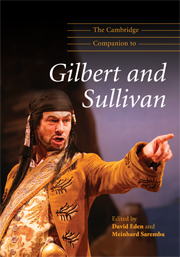Book contents
- Frontmatter
- Part I Background
- 1 Savoy opera and its discontents: the theatrical background to a quarrel
- 2 Identity crisis and the search for English opera: the Savoy Theatre in the 1890s
- 3 Resituating Gilbert and Sullivan: the musical and aesthetic context
- 4 ‘We sing as one individual’? Popular misconceptions of ‘Gilbert and Sullivan’
- Part II Focus
- Part III Reception
- Part IV Into the twenty-first century
- Appendix 1 Who wrote the overtures?
- Appendix 2 Stage and choral works by Arthur Sullivan and W. S. Gilbert
- Appendix 3 Modern editions of works by Arthur Sullivan and W. S. Gilbert
- Appendix 4 Sullivan's archetypes of English opera
- Notes
- Bibliography and further reading
- Index
- Plate section
2 - Identity crisis and the search for English opera: the Savoy Theatre in the 1890s
from Part I - Background
Published online by Cambridge University Press: 28 September 2011
- Frontmatter
- Part I Background
- 1 Savoy opera and its discontents: the theatrical background to a quarrel
- 2 Identity crisis and the search for English opera: the Savoy Theatre in the 1890s
- 3 Resituating Gilbert and Sullivan: the musical and aesthetic context
- 4 ‘We sing as one individual’? Popular misconceptions of ‘Gilbert and Sullivan’
- Part II Focus
- Part III Reception
- Part IV Into the twenty-first century
- Appendix 1 Who wrote the overtures?
- Appendix 2 Stage and choral works by Arthur Sullivan and W. S. Gilbert
- Appendix 3 Modern editions of works by Arthur Sullivan and W. S. Gilbert
- Appendix 4 Sullivan's archetypes of English opera
- Notes
- Bibliography and further reading
- Index
- Plate section
Summary
Relations between Gilbert and Sullivan were seldom harmonious, but the Carpet Quarrel of 1890 was so traumatic for all concerned that nothing would be the same afterwards. Indeed this seems to have been Gilbert's express wish. Beginning in April, ostensibly about the preliminary production expenses for The Gondoliers, the dispute reached its very public nadir in the law courts in September. One immediate result of the breakdown in relations was that there was no new Gilbert and Sullivan opera to follow The Gondoliers when it closed on 20 June 1891 after 554 performances. The problem for Richard D'Oyly Carte, the Savoy Theatre's thus far extraordinarily successful impresario, was how to fill the void. Carte responded to the challenge in many different ways, and the sheer variety of the productions which he mounted at the Savoy make this final decade the most interesting in the theatre's history; indeed it goes to the heart of what people have subsequently come to understand by the term ‘Savoy opera’.
Experiments
The Nautch Girl (30 June 1891) was to be the test case, the first opera at the Savoy to which neither Sullivan nor Gilbert contributed. Carte's decision in this instance was to commission an opera that would be as much like its 1880s predecessors as possible, and to this end he sought out Edward Solomon (1855–95), an experienced composer, trusted (and doubtless recommended) by Sullivan himself. Solomon was well known as one of the foremost in the circle of composers capable of producing a comic opera that could hold the London stage. His Billee Taylor (1880) had been a substantial success on both sides of the Atlantic, and Carte had already been involved with him professionally. Lyrics were provided by Frank Desprez (1853–1916) and George Dance (1857–1932).
- Type
- Chapter
- Information
- The Cambridge Companion to Gilbert and Sullivan , pp. 22 - 35Publisher: Cambridge University PressPrint publication year: 2009



